Comprehensive Report on Research Methods and Academic Skills
VerifiedAdded on 2023/06/04
|9
|2378
|164
Report
AI Summary
This report provides a comprehensive overview of research methods and academic skills essential for business studies. It delves into ethical considerations in business research, highlighting the importance of informed consent and confidentiality. The report differentiates between applied and basic research, using Frito-Lay as an example of applied research. It further contrasts inductive and deductive research approaches, emphasizing theory development and empirical research. The report also addresses the impact of narcissistic leadership on research objectives and explores comparative research within management studies, particularly its relevance to MBA assignments. The document concludes by emphasizing the role of comparative research in training organizational leaders and enhancing managerial skills. This student contributed assignment is available on Desklib, a platform offering AI-based study tools and a wealth of academic resources.
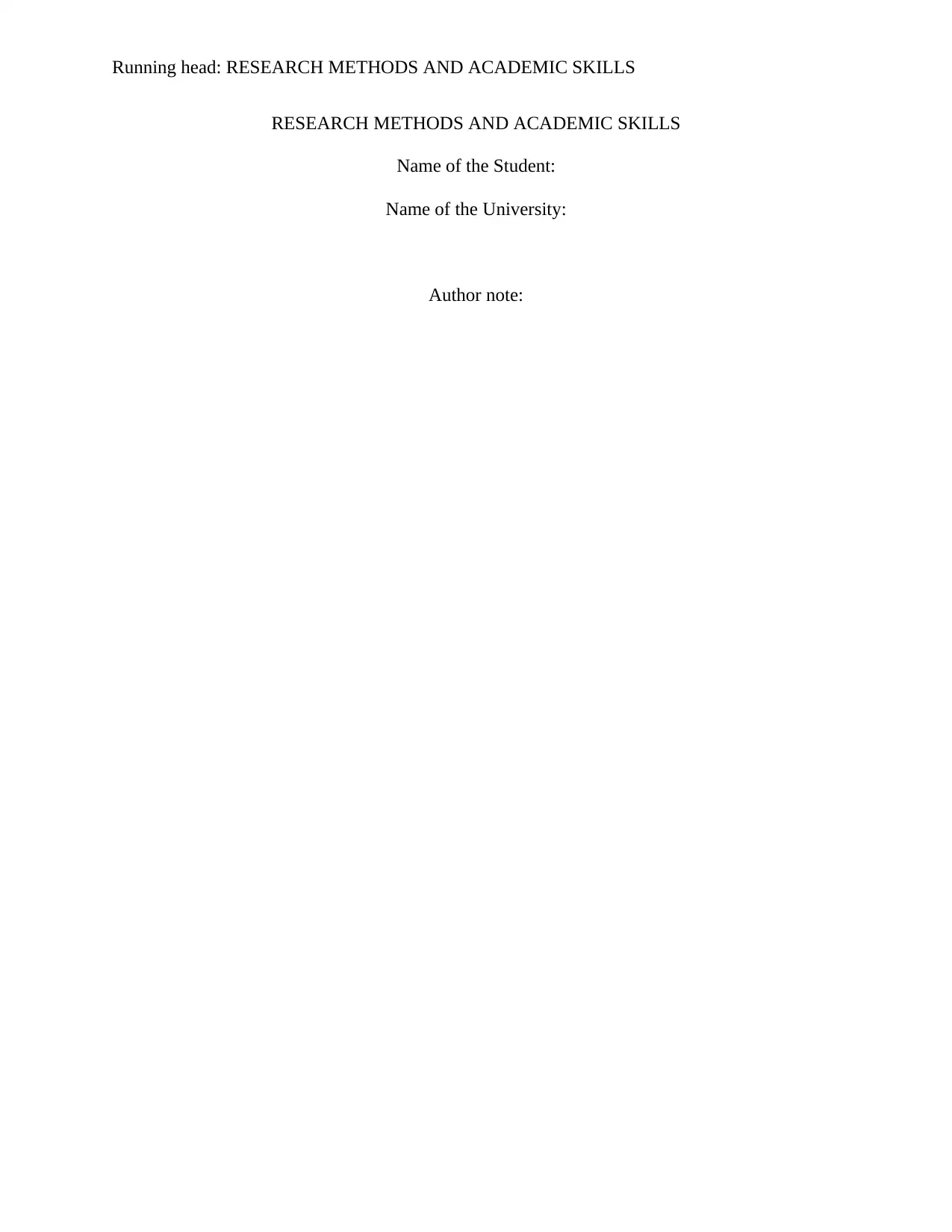
Running head: RESEARCH METHODS AND ACADEMIC SKILLS
RESEARCH METHODS AND ACADEMIC SKILLS
Name of the Student:
Name of the University:
Author note:
RESEARCH METHODS AND ACADEMIC SKILLS
Name of the Student:
Name of the University:
Author note:
Paraphrase This Document
Need a fresh take? Get an instant paraphrase of this document with our AI Paraphraser
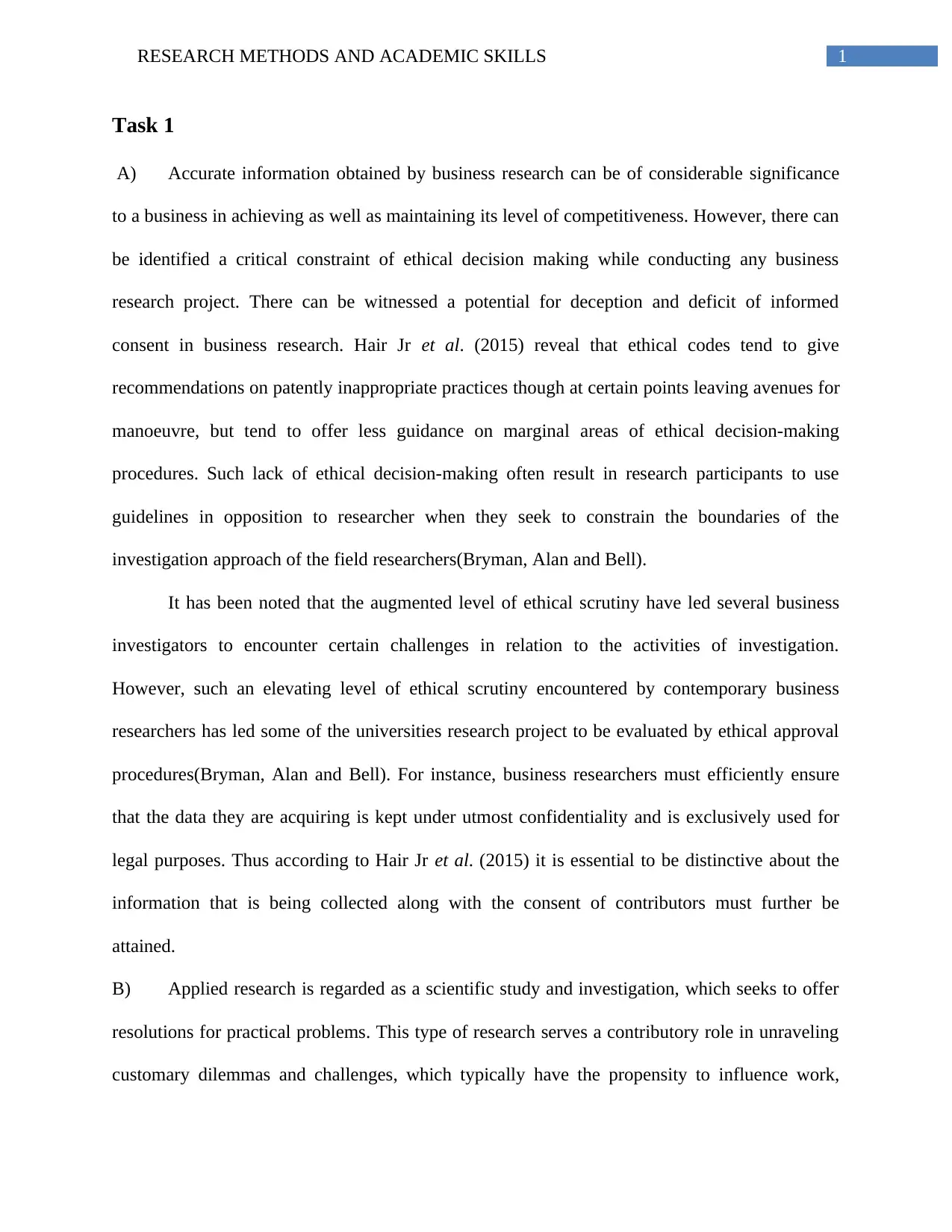
1RESEARCH METHODS AND ACADEMIC SKILLS
Task 1
A) Accurate information obtained by business research can be of considerable significance
to a business in achieving as well as maintaining its level of competitiveness. However, there can
be identified a critical constraint of ethical decision making while conducting any business
research project. There can be witnessed a potential for deception and deficit of informed
consent in business research. Hair Jr et al. (2015) reveal that ethical codes tend to give
recommendations on patently inappropriate practices though at certain points leaving avenues for
manoeuvre, but tend to offer less guidance on marginal areas of ethical decision-making
procedures. Such lack of ethical decision-making often result in research participants to use
guidelines in opposition to researcher when they seek to constrain the boundaries of the
investigation approach of the field researchers(Bryman, Alan and Bell).
It has been noted that the augmented level of ethical scrutiny have led several business
investigators to encounter certain challenges in relation to the activities of investigation.
However, such an elevating level of ethical scrutiny encountered by contemporary business
researchers has led some of the universities research project to be evaluated by ethical approval
procedures(Bryman, Alan and Bell). For instance, business researchers must efficiently ensure
that the data they are acquiring is kept under utmost confidentiality and is exclusively used for
legal purposes. Thus according to Hair Jr et al. (2015) it is essential to be distinctive about the
information that is being collected along with the consent of contributors must further be
attained.
B) Applied research is regarded as a scientific study and investigation, which seeks to offer
resolutions for practical problems. This type of research serves a contributory role in unraveling
customary dilemmas and challenges, which typically have the propensity to influence work,
Task 1
A) Accurate information obtained by business research can be of considerable significance
to a business in achieving as well as maintaining its level of competitiveness. However, there can
be identified a critical constraint of ethical decision making while conducting any business
research project. There can be witnessed a potential for deception and deficit of informed
consent in business research. Hair Jr et al. (2015) reveal that ethical codes tend to give
recommendations on patently inappropriate practices though at certain points leaving avenues for
manoeuvre, but tend to offer less guidance on marginal areas of ethical decision-making
procedures. Such lack of ethical decision-making often result in research participants to use
guidelines in opposition to researcher when they seek to constrain the boundaries of the
investigation approach of the field researchers(Bryman, Alan and Bell).
It has been noted that the augmented level of ethical scrutiny have led several business
investigators to encounter certain challenges in relation to the activities of investigation.
However, such an elevating level of ethical scrutiny encountered by contemporary business
researchers has led some of the universities research project to be evaluated by ethical approval
procedures(Bryman, Alan and Bell). For instance, business researchers must efficiently ensure
that the data they are acquiring is kept under utmost confidentiality and is exclusively used for
legal purposes. Thus according to Hair Jr et al. (2015) it is essential to be distinctive about the
information that is being collected along with the consent of contributors must further be
attained.
B) Applied research is regarded as a scientific study and investigation, which seeks to offer
resolutions for practical problems. This type of research serves a contributory role in unraveling
customary dilemmas and challenges, which typically have the propensity to influence work,
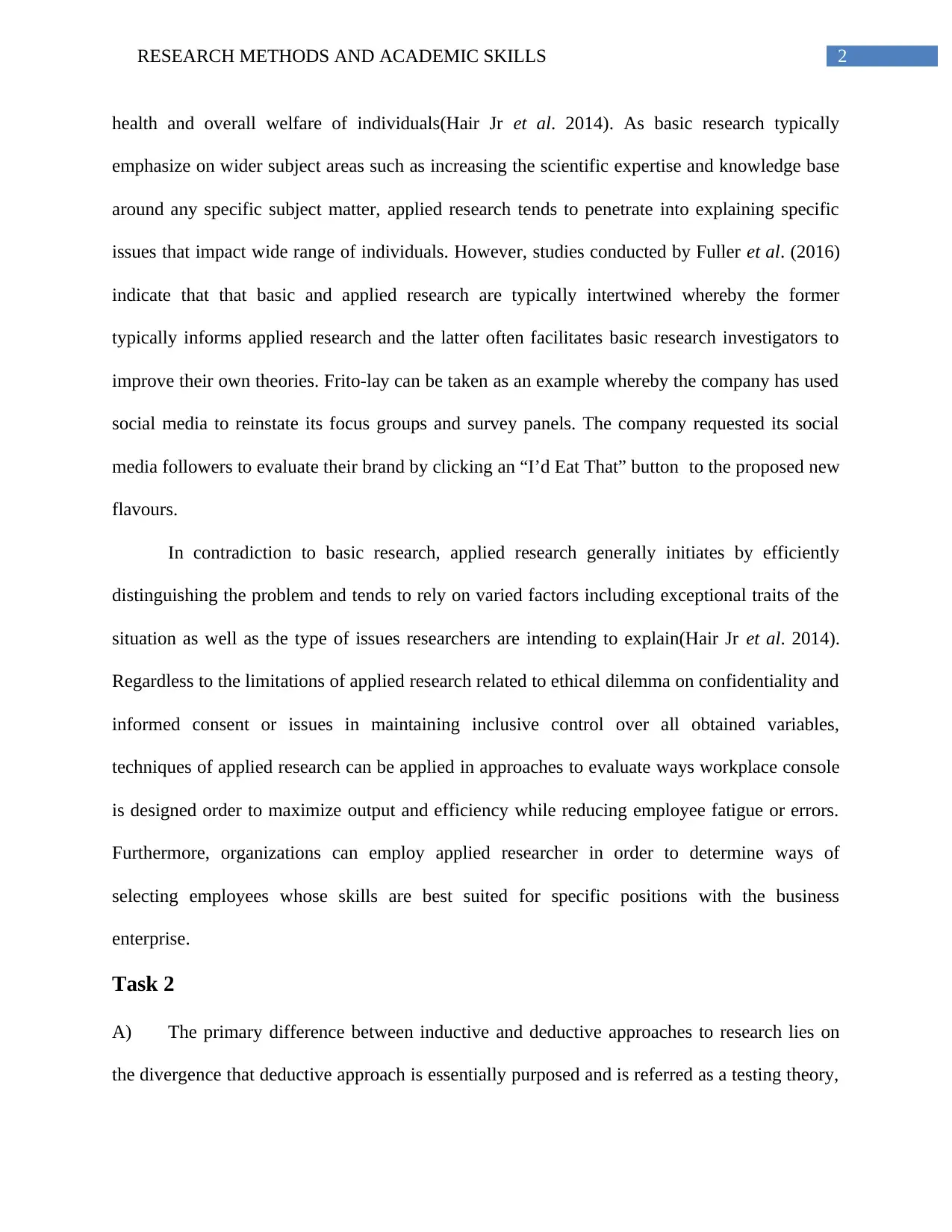
2RESEARCH METHODS AND ACADEMIC SKILLS
health and overall welfare of individuals(Hair Jr et al. 2014). As basic research typically
emphasize on wider subject areas such as increasing the scientific expertise and knowledge base
around any specific subject matter, applied research tends to penetrate into explaining specific
issues that impact wide range of individuals. However, studies conducted by Fuller et al. (2016)
indicate that that basic and applied research are typically intertwined whereby the former
typically informs applied research and the latter often facilitates basic research investigators to
improve their own theories. Frito-lay can be taken as an example whereby the company has used
social media to reinstate its focus groups and survey panels. The company requested its social
media followers to evaluate their brand by clicking an “I’d Eat That” button to the proposed new
flavours.
In contradiction to basic research, applied research generally initiates by efficiently
distinguishing the problem and tends to rely on varied factors including exceptional traits of the
situation as well as the type of issues researchers are intending to explain(Hair Jr et al. 2014).
Regardless to the limitations of applied research related to ethical dilemma on confidentiality and
informed consent or issues in maintaining inclusive control over all obtained variables,
techniques of applied research can be applied in approaches to evaluate ways workplace console
is designed order to maximize output and efficiency while reducing employee fatigue or errors.
Furthermore, organizations can employ applied researcher in order to determine ways of
selecting employees whose skills are best suited for specific positions with the business
enterprise.
Task 2
A) The primary difference between inductive and deductive approaches to research lies on
the divergence that deductive approach is essentially purposed and is referred as a testing theory,
health and overall welfare of individuals(Hair Jr et al. 2014). As basic research typically
emphasize on wider subject areas such as increasing the scientific expertise and knowledge base
around any specific subject matter, applied research tends to penetrate into explaining specific
issues that impact wide range of individuals. However, studies conducted by Fuller et al. (2016)
indicate that that basic and applied research are typically intertwined whereby the former
typically informs applied research and the latter often facilitates basic research investigators to
improve their own theories. Frito-lay can be taken as an example whereby the company has used
social media to reinstate its focus groups and survey panels. The company requested its social
media followers to evaluate their brand by clicking an “I’d Eat That” button to the proposed new
flavours.
In contradiction to basic research, applied research generally initiates by efficiently
distinguishing the problem and tends to rely on varied factors including exceptional traits of the
situation as well as the type of issues researchers are intending to explain(Hair Jr et al. 2014).
Regardless to the limitations of applied research related to ethical dilemma on confidentiality and
informed consent or issues in maintaining inclusive control over all obtained variables,
techniques of applied research can be applied in approaches to evaluate ways workplace console
is designed order to maximize output and efficiency while reducing employee fatigue or errors.
Furthermore, organizations can employ applied researcher in order to determine ways of
selecting employees whose skills are best suited for specific positions with the business
enterprise.
Task 2
A) The primary difference between inductive and deductive approaches to research lies on
the divergence that deductive approach is essentially purposed and is referred as a testing theory,
⊘ This is a preview!⊘
Do you want full access?
Subscribe today to unlock all pages.

Trusted by 1+ million students worldwide
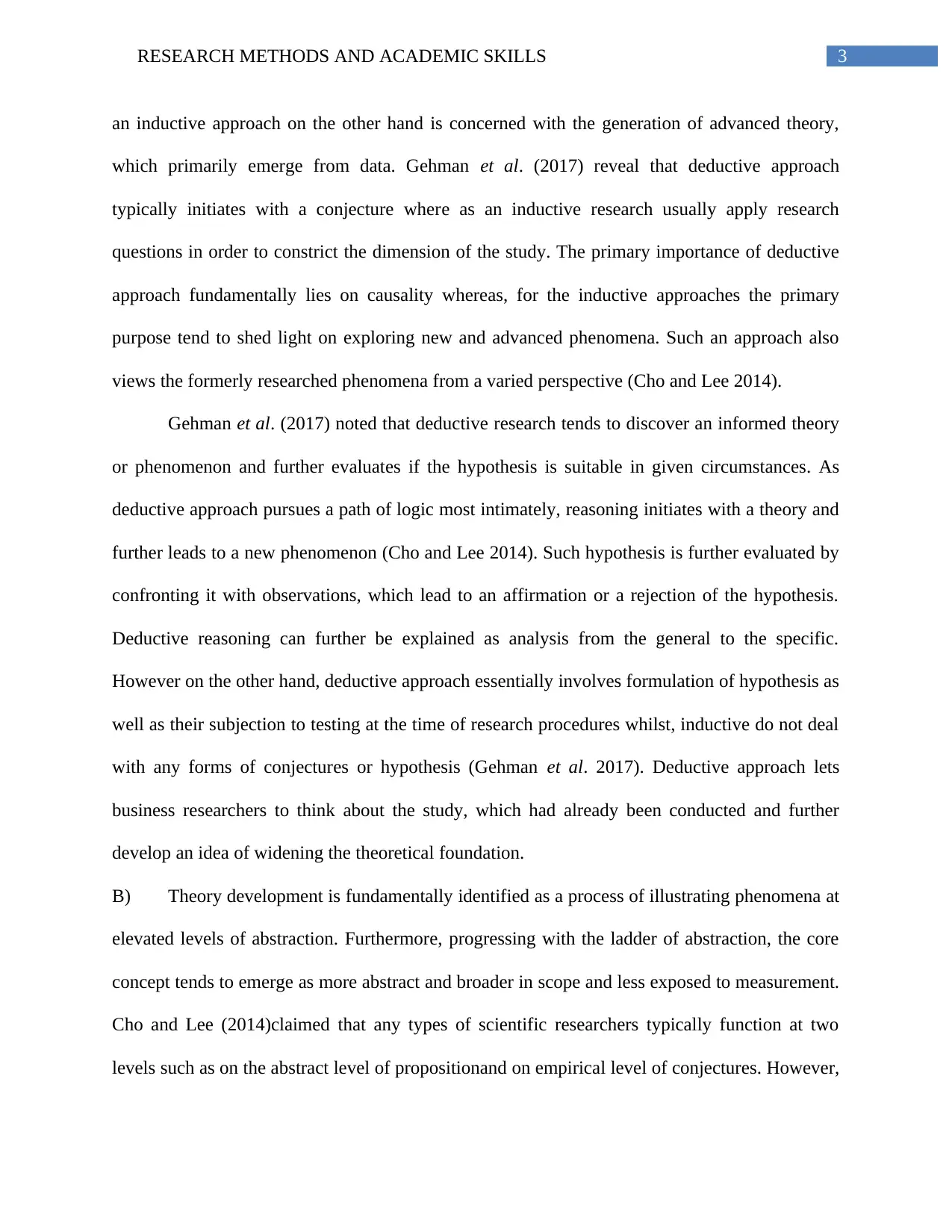
3RESEARCH METHODS AND ACADEMIC SKILLS
an inductive approach on the other hand is concerned with the generation of advanced theory,
which primarily emerge from data. Gehman et al. (2017) reveal that deductive approach
typically initiates with a conjecture where as an inductive research usually apply research
questions in order to constrict the dimension of the study. The primary importance of deductive
approach fundamentally lies on causality whereas, for the inductive approaches the primary
purpose tend to shed light on exploring new and advanced phenomena. Such an approach also
views the formerly researched phenomena from a varied perspective (Cho and Lee 2014).
Gehman et al. (2017) noted that deductive research tends to discover an informed theory
or phenomenon and further evaluates if the hypothesis is suitable in given circumstances. As
deductive approach pursues a path of logic most intimately, reasoning initiates with a theory and
further leads to a new phenomenon (Cho and Lee 2014). Such hypothesis is further evaluated by
confronting it with observations, which lead to an affirmation or a rejection of the hypothesis.
Deductive reasoning can further be explained as analysis from the general to the specific.
However on the other hand, deductive approach essentially involves formulation of hypothesis as
well as their subjection to testing at the time of research procedures whilst, inductive do not deal
with any forms of conjectures or hypothesis (Gehman et al. 2017). Deductive approach lets
business researchers to think about the study, which had already been conducted and further
develop an idea of widening the theoretical foundation.
B) Theory development is fundamentally identified as a process of illustrating phenomena at
elevated levels of abstraction. Furthermore, progressing with the ladder of abstraction, the core
concept tends to emerge as more abstract and broader in scope and less exposed to measurement.
Cho and Lee (2014)claimed that any types of scientific researchers typically function at two
levels such as on the abstract level of propositionand on empirical level of conjectures. However,
an inductive approach on the other hand is concerned with the generation of advanced theory,
which primarily emerge from data. Gehman et al. (2017) reveal that deductive approach
typically initiates with a conjecture where as an inductive research usually apply research
questions in order to constrict the dimension of the study. The primary importance of deductive
approach fundamentally lies on causality whereas, for the inductive approaches the primary
purpose tend to shed light on exploring new and advanced phenomena. Such an approach also
views the formerly researched phenomena from a varied perspective (Cho and Lee 2014).
Gehman et al. (2017) noted that deductive research tends to discover an informed theory
or phenomenon and further evaluates if the hypothesis is suitable in given circumstances. As
deductive approach pursues a path of logic most intimately, reasoning initiates with a theory and
further leads to a new phenomenon (Cho and Lee 2014). Such hypothesis is further evaluated by
confronting it with observations, which lead to an affirmation or a rejection of the hypothesis.
Deductive reasoning can further be explained as analysis from the general to the specific.
However on the other hand, deductive approach essentially involves formulation of hypothesis as
well as their subjection to testing at the time of research procedures whilst, inductive do not deal
with any forms of conjectures or hypothesis (Gehman et al. 2017). Deductive approach lets
business researchers to think about the study, which had already been conducted and further
develop an idea of widening the theoretical foundation.
B) Theory development is fundamentally identified as a process of illustrating phenomena at
elevated levels of abstraction. Furthermore, progressing with the ladder of abstraction, the core
concept tends to emerge as more abstract and broader in scope and less exposed to measurement.
Cho and Lee (2014)claimed that any types of scientific researchers typically function at two
levels such as on the abstract level of propositionand on empirical level of conjectures. However,
Paraphrase This Document
Need a fresh take? Get an instant paraphrase of this document with our AI Paraphraser
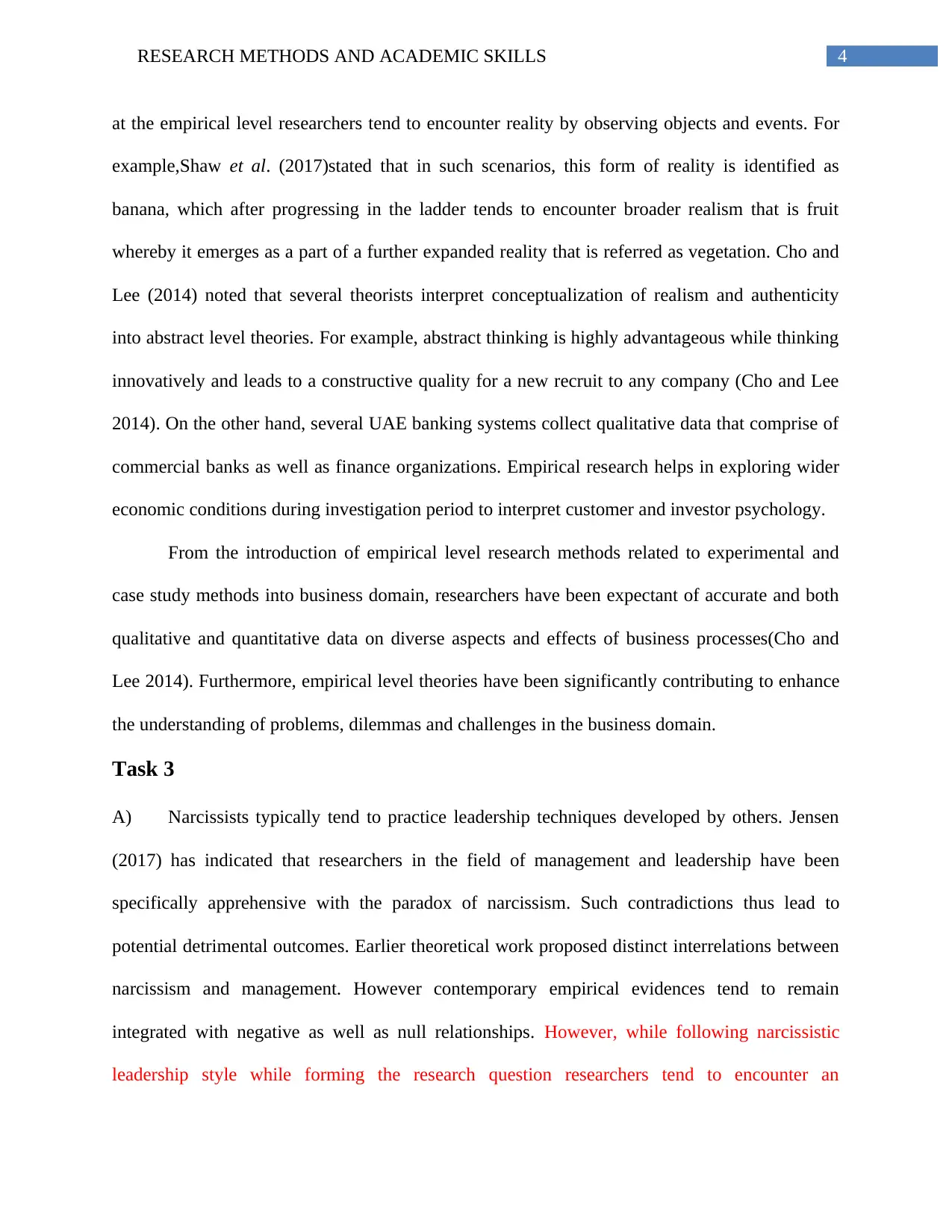
4RESEARCH METHODS AND ACADEMIC SKILLS
at the empirical level researchers tend to encounter reality by observing objects and events. For
example,Shaw et al. (2017)stated that in such scenarios, this form of reality is identified as
banana, which after progressing in the ladder tends to encounter broader realism that is fruit
whereby it emerges as a part of a further expanded reality that is referred as vegetation. Cho and
Lee (2014) noted that several theorists interpret conceptualization of realism and authenticity
into abstract level theories. For example, abstract thinking is highly advantageous while thinking
innovatively and leads to a constructive quality for a new recruit to any company (Cho and Lee
2014). On the other hand, several UAE banking systems collect qualitative data that comprise of
commercial banks as well as finance organizations. Empirical research helps in exploring wider
economic conditions during investigation period to interpret customer and investor psychology.
From the introduction of empirical level research methods related to experimental and
case study methods into business domain, researchers have been expectant of accurate and both
qualitative and quantitative data on diverse aspects and effects of business processes(Cho and
Lee 2014). Furthermore, empirical level theories have been significantly contributing to enhance
the understanding of problems, dilemmas and challenges in the business domain.
Task 3
A) Narcissists typically tend to practice leadership techniques developed by others. Jensen
(2017) has indicated that researchers in the field of management and leadership have been
specifically apprehensive with the paradox of narcissism. Such contradictions thus lead to
potential detrimental outcomes. Earlier theoretical work proposed distinct interrelations between
narcissism and management. However contemporary empirical evidences tend to remain
integrated with negative as well as null relationships. However, while following narcissistic
leadership style while forming the research question researchers tend to encounter an
at the empirical level researchers tend to encounter reality by observing objects and events. For
example,Shaw et al. (2017)stated that in such scenarios, this form of reality is identified as
banana, which after progressing in the ladder tends to encounter broader realism that is fruit
whereby it emerges as a part of a further expanded reality that is referred as vegetation. Cho and
Lee (2014) noted that several theorists interpret conceptualization of realism and authenticity
into abstract level theories. For example, abstract thinking is highly advantageous while thinking
innovatively and leads to a constructive quality for a new recruit to any company (Cho and Lee
2014). On the other hand, several UAE banking systems collect qualitative data that comprise of
commercial banks as well as finance organizations. Empirical research helps in exploring wider
economic conditions during investigation period to interpret customer and investor psychology.
From the introduction of empirical level research methods related to experimental and
case study methods into business domain, researchers have been expectant of accurate and both
qualitative and quantitative data on diverse aspects and effects of business processes(Cho and
Lee 2014). Furthermore, empirical level theories have been significantly contributing to enhance
the understanding of problems, dilemmas and challenges in the business domain.
Task 3
A) Narcissists typically tend to practice leadership techniques developed by others. Jensen
(2017) has indicated that researchers in the field of management and leadership have been
specifically apprehensive with the paradox of narcissism. Such contradictions thus lead to
potential detrimental outcomes. Earlier theoretical work proposed distinct interrelations between
narcissism and management. However contemporary empirical evidences tend to remain
integrated with negative as well as null relationships. However, while following narcissistic
leadership style while forming the research question researchers tend to encounter an
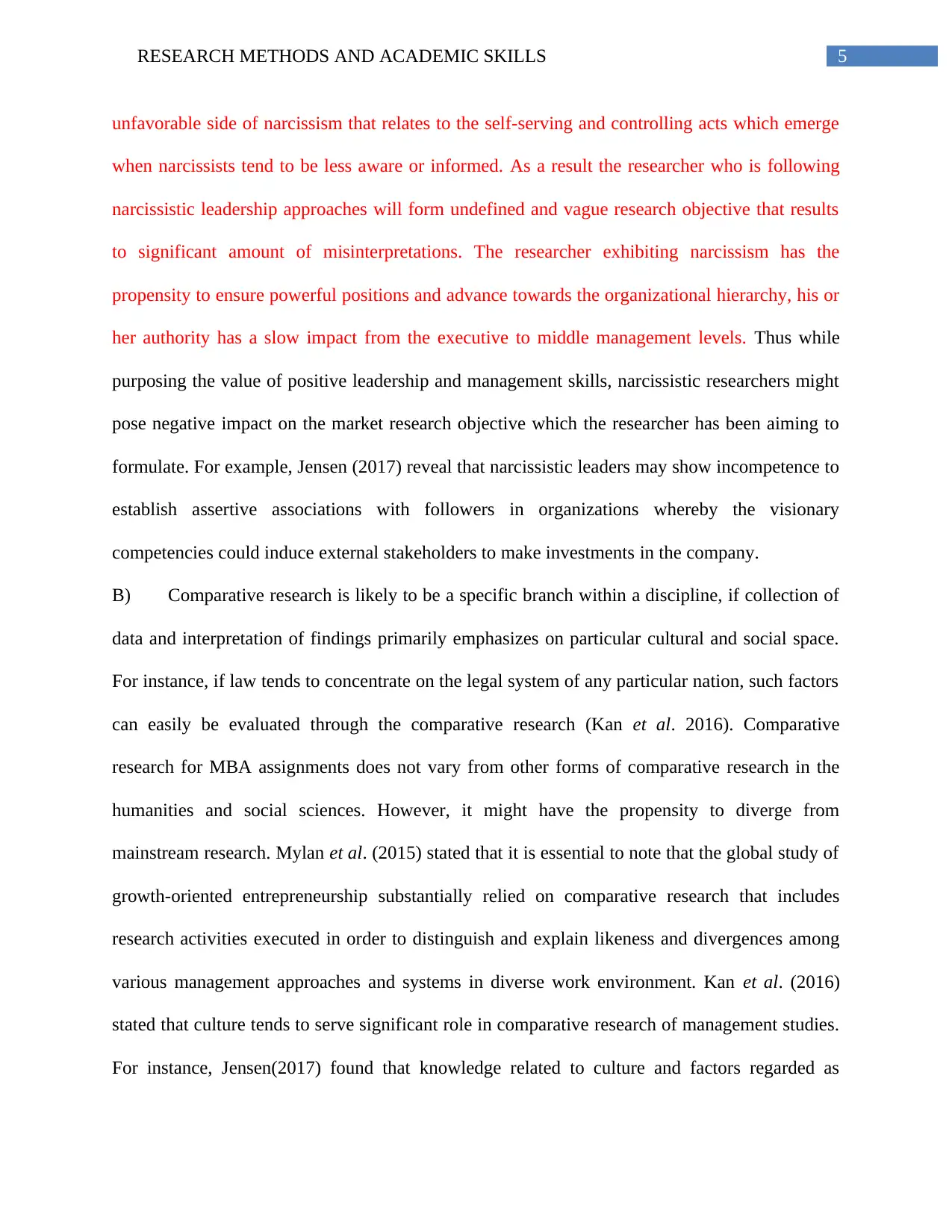
5RESEARCH METHODS AND ACADEMIC SKILLS
unfavorable side of narcissism that relates to the self-serving and controlling acts which emerge
when narcissists tend to be less aware or informed. As a result the researcher who is following
narcissistic leadership approaches will form undefined and vague research objective that results
to significant amount of misinterpretations. The researcher exhibiting narcissism has the
propensity to ensure powerful positions and advance towards the organizational hierarchy, his or
her authority has a slow impact from the executive to middle management levels. Thus while
purposing the value of positive leadership and management skills, narcissistic researchers might
pose negative impact on the market research objective which the researcher has been aiming to
formulate. For example, Jensen (2017) reveal that narcissistic leaders may show incompetence to
establish assertive associations with followers in organizations whereby the visionary
competencies could induce external stakeholders to make investments in the company.
B) Comparative research is likely to be a specific branch within a discipline, if collection of
data and interpretation of findings primarily emphasizes on particular cultural and social space.
For instance, if law tends to concentrate on the legal system of any particular nation, such factors
can easily be evaluated through the comparative research (Kan et al. 2016). Comparative
research for MBA assignments does not vary from other forms of comparative research in the
humanities and social sciences. However, it might have the propensity to diverge from
mainstream research. Mylan et al. (2015) stated that it is essential to note that the global study of
growth-oriented entrepreneurship substantially relied on comparative research that includes
research activities executed in order to distinguish and explain likeness and divergences among
various management approaches and systems in diverse work environment. Kan et al. (2016)
stated that culture tends to serve significant role in comparative research of management studies.
For instance, Jensen(2017) found that knowledge related to culture and factors regarded as
unfavorable side of narcissism that relates to the self-serving and controlling acts which emerge
when narcissists tend to be less aware or informed. As a result the researcher who is following
narcissistic leadership approaches will form undefined and vague research objective that results
to significant amount of misinterpretations. The researcher exhibiting narcissism has the
propensity to ensure powerful positions and advance towards the organizational hierarchy, his or
her authority has a slow impact from the executive to middle management levels. Thus while
purposing the value of positive leadership and management skills, narcissistic researchers might
pose negative impact on the market research objective which the researcher has been aiming to
formulate. For example, Jensen (2017) reveal that narcissistic leaders may show incompetence to
establish assertive associations with followers in organizations whereby the visionary
competencies could induce external stakeholders to make investments in the company.
B) Comparative research is likely to be a specific branch within a discipline, if collection of
data and interpretation of findings primarily emphasizes on particular cultural and social space.
For instance, if law tends to concentrate on the legal system of any particular nation, such factors
can easily be evaluated through the comparative research (Kan et al. 2016). Comparative
research for MBA assignments does not vary from other forms of comparative research in the
humanities and social sciences. However, it might have the propensity to diverge from
mainstream research. Mylan et al. (2015) stated that it is essential to note that the global study of
growth-oriented entrepreneurship substantially relied on comparative research that includes
research activities executed in order to distinguish and explain likeness and divergences among
various management approaches and systems in diverse work environment. Kan et al. (2016)
stated that culture tends to serve significant role in comparative research of management studies.
For instance, Jensen(2017) found that knowledge related to culture and factors regarded as
⊘ This is a preview!⊘
Do you want full access?
Subscribe today to unlock all pages.

Trusted by 1+ million students worldwide
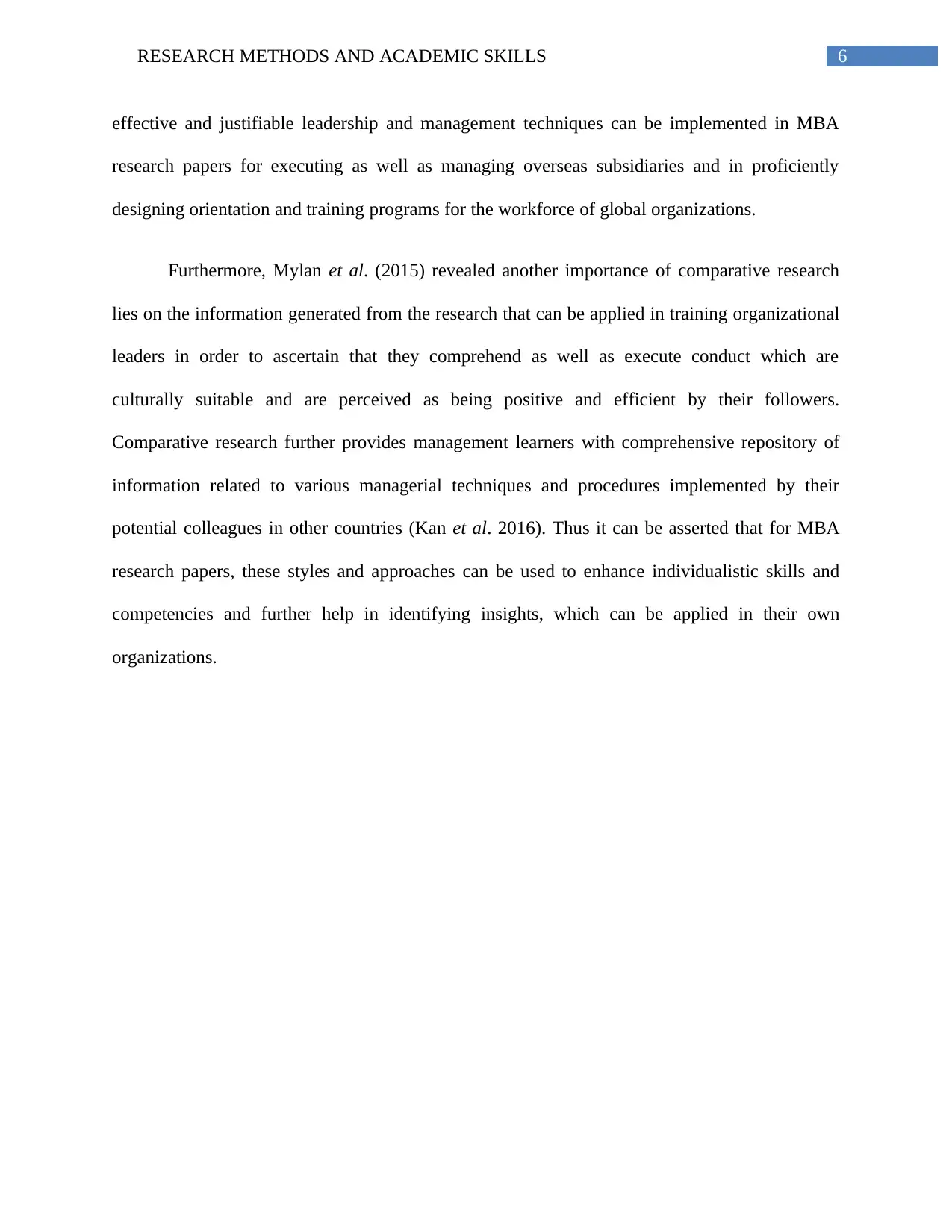
6RESEARCH METHODS AND ACADEMIC SKILLS
effective and justifiable leadership and management techniques can be implemented in MBA
research papers for executing as well as managing overseas subsidiaries and in proficiently
designing orientation and training programs for the workforce of global organizations.
Furthermore, Mylan et al. (2015) revealed another importance of comparative research
lies on the information generated from the research that can be applied in training organizational
leaders in order to ascertain that they comprehend as well as execute conduct which are
culturally suitable and are perceived as being positive and efficient by their followers.
Comparative research further provides management learners with comprehensive repository of
information related to various managerial techniques and procedures implemented by their
potential colleagues in other countries (Kan et al. 2016). Thus it can be asserted that for MBA
research papers, these styles and approaches can be used to enhance individualistic skills and
competencies and further help in identifying insights, which can be applied in their own
organizations.
effective and justifiable leadership and management techniques can be implemented in MBA
research papers for executing as well as managing overseas subsidiaries and in proficiently
designing orientation and training programs for the workforce of global organizations.
Furthermore, Mylan et al. (2015) revealed another importance of comparative research
lies on the information generated from the research that can be applied in training organizational
leaders in order to ascertain that they comprehend as well as execute conduct which are
culturally suitable and are perceived as being positive and efficient by their followers.
Comparative research further provides management learners with comprehensive repository of
information related to various managerial techniques and procedures implemented by their
potential colleagues in other countries (Kan et al. 2016). Thus it can be asserted that for MBA
research papers, these styles and approaches can be used to enhance individualistic skills and
competencies and further help in identifying insights, which can be applied in their own
organizations.
Paraphrase This Document
Need a fresh take? Get an instant paraphrase of this document with our AI Paraphraser
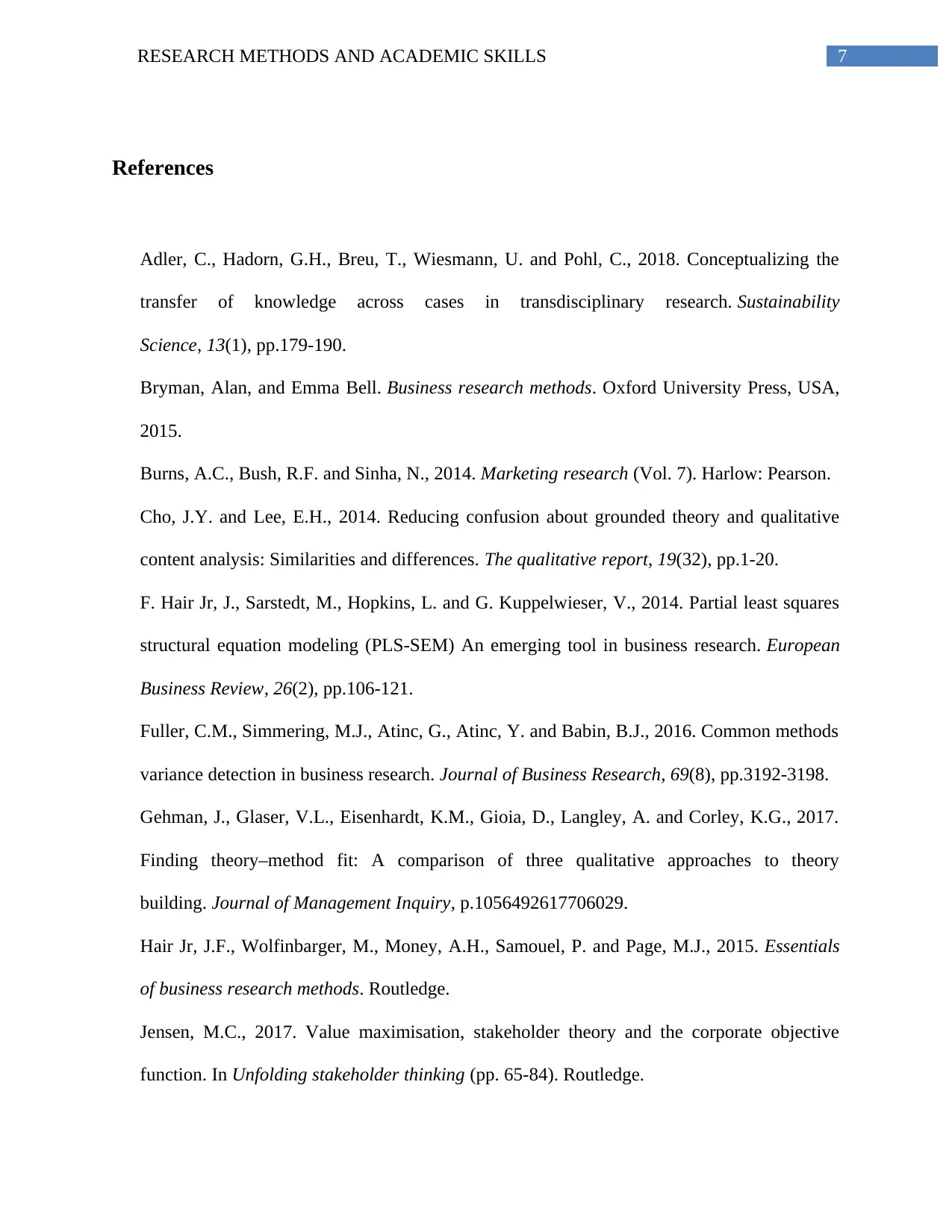
7RESEARCH METHODS AND ACADEMIC SKILLS
References
Adler, C., Hadorn, G.H., Breu, T., Wiesmann, U. and Pohl, C., 2018. Conceptualizing the
transfer of knowledge across cases in transdisciplinary research. Sustainability
Science, 13(1), pp.179-190.
Bryman, Alan, and Emma Bell. Business research methods. Oxford University Press, USA,
2015.
Burns, A.C., Bush, R.F. and Sinha, N., 2014. Marketing research (Vol. 7). Harlow: Pearson.
Cho, J.Y. and Lee, E.H., 2014. Reducing confusion about grounded theory and qualitative
content analysis: Similarities and differences. The qualitative report, 19(32), pp.1-20.
F. Hair Jr, J., Sarstedt, M., Hopkins, L. and G. Kuppelwieser, V., 2014. Partial least squares
structural equation modeling (PLS-SEM) An emerging tool in business research. European
Business Review, 26(2), pp.106-121.
Fuller, C.M., Simmering, M.J., Atinc, G., Atinc, Y. and Babin, B.J., 2016. Common methods
variance detection in business research. Journal of Business Research, 69(8), pp.3192-3198.
Gehman, J., Glaser, V.L., Eisenhardt, K.M., Gioia, D., Langley, A. and Corley, K.G., 2017.
Finding theory–method fit: A comparison of three qualitative approaches to theory
building. Journal of Management Inquiry, p.1056492617706029.
Hair Jr, J.F., Wolfinbarger, M., Money, A.H., Samouel, P. and Page, M.J., 2015. Essentials
of business research methods. Routledge.
Jensen, M.C., 2017. Value maximisation, stakeholder theory and the corporate objective
function. In Unfolding stakeholder thinking (pp. 65-84). Routledge.
References
Adler, C., Hadorn, G.H., Breu, T., Wiesmann, U. and Pohl, C., 2018. Conceptualizing the
transfer of knowledge across cases in transdisciplinary research. Sustainability
Science, 13(1), pp.179-190.
Bryman, Alan, and Emma Bell. Business research methods. Oxford University Press, USA,
2015.
Burns, A.C., Bush, R.F. and Sinha, N., 2014. Marketing research (Vol. 7). Harlow: Pearson.
Cho, J.Y. and Lee, E.H., 2014. Reducing confusion about grounded theory and qualitative
content analysis: Similarities and differences. The qualitative report, 19(32), pp.1-20.
F. Hair Jr, J., Sarstedt, M., Hopkins, L. and G. Kuppelwieser, V., 2014. Partial least squares
structural equation modeling (PLS-SEM) An emerging tool in business research. European
Business Review, 26(2), pp.106-121.
Fuller, C.M., Simmering, M.J., Atinc, G., Atinc, Y. and Babin, B.J., 2016. Common methods
variance detection in business research. Journal of Business Research, 69(8), pp.3192-3198.
Gehman, J., Glaser, V.L., Eisenhardt, K.M., Gioia, D., Langley, A. and Corley, K.G., 2017.
Finding theory–method fit: A comparison of three qualitative approaches to theory
building. Journal of Management Inquiry, p.1056492617706029.
Hair Jr, J.F., Wolfinbarger, M., Money, A.H., Samouel, P. and Page, M.J., 2015. Essentials
of business research methods. Routledge.
Jensen, M.C., 2017. Value maximisation, stakeholder theory and the corporate objective
function. In Unfolding stakeholder thinking (pp. 65-84). Routledge.
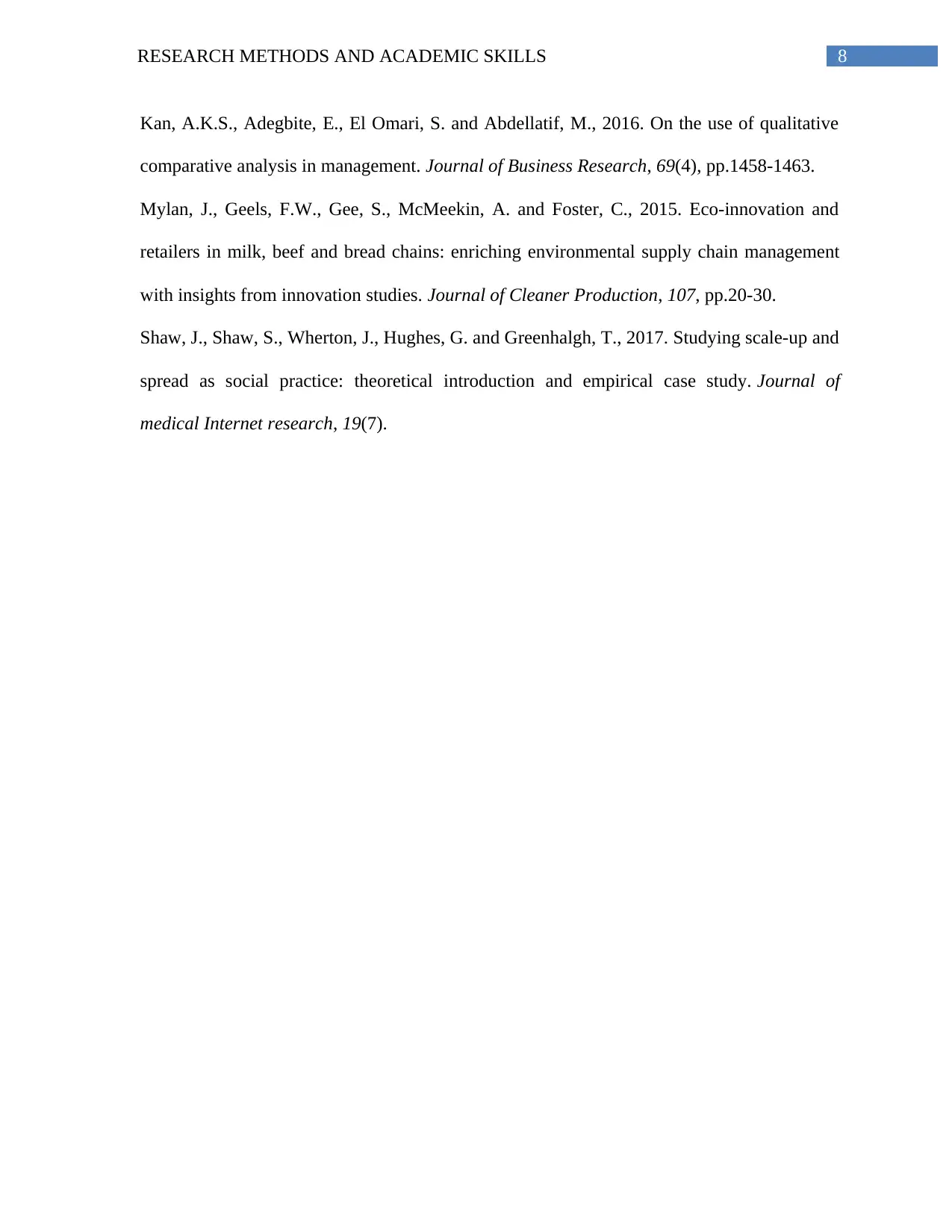
8RESEARCH METHODS AND ACADEMIC SKILLS
Kan, A.K.S., Adegbite, E., El Omari, S. and Abdellatif, M., 2016. On the use of qualitative
comparative analysis in management. Journal of Business Research, 69(4), pp.1458-1463.
Mylan, J., Geels, F.W., Gee, S., McMeekin, A. and Foster, C., 2015. Eco-innovation and
retailers in milk, beef and bread chains: enriching environmental supply chain management
with insights from innovation studies. Journal of Cleaner Production, 107, pp.20-30.
Shaw, J., Shaw, S., Wherton, J., Hughes, G. and Greenhalgh, T., 2017. Studying scale-up and
spread as social practice: theoretical introduction and empirical case study. Journal of
medical Internet research, 19(7).
Kan, A.K.S., Adegbite, E., El Omari, S. and Abdellatif, M., 2016. On the use of qualitative
comparative analysis in management. Journal of Business Research, 69(4), pp.1458-1463.
Mylan, J., Geels, F.W., Gee, S., McMeekin, A. and Foster, C., 2015. Eco-innovation and
retailers in milk, beef and bread chains: enriching environmental supply chain management
with insights from innovation studies. Journal of Cleaner Production, 107, pp.20-30.
Shaw, J., Shaw, S., Wherton, J., Hughes, G. and Greenhalgh, T., 2017. Studying scale-up and
spread as social practice: theoretical introduction and empirical case study. Journal of
medical Internet research, 19(7).
⊘ This is a preview!⊘
Do you want full access?
Subscribe today to unlock all pages.

Trusted by 1+ million students worldwide
1 out of 9
Your All-in-One AI-Powered Toolkit for Academic Success.
+13062052269
info@desklib.com
Available 24*7 on WhatsApp / Email
![[object Object]](/_next/static/media/star-bottom.7253800d.svg)
Unlock your academic potential
Copyright © 2020–2026 A2Z Services. All Rights Reserved. Developed and managed by ZUCOL.

